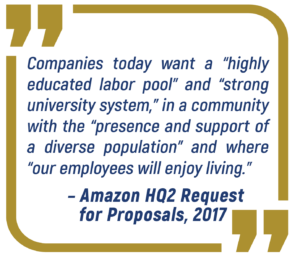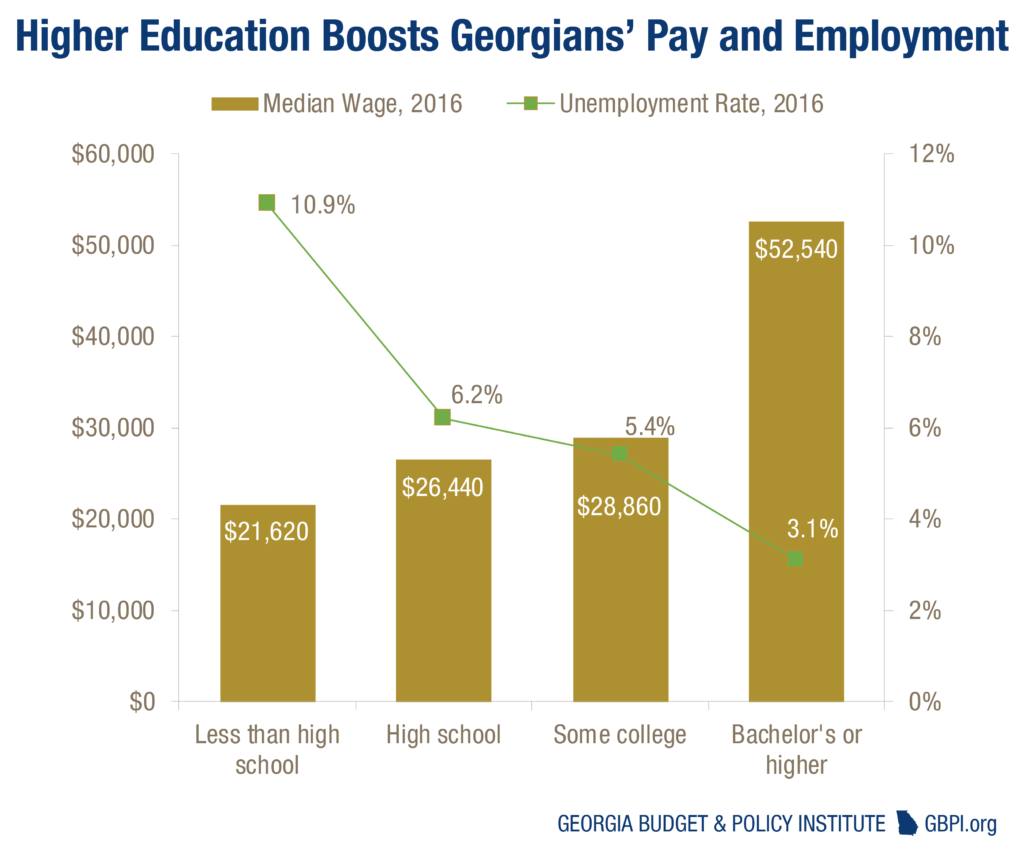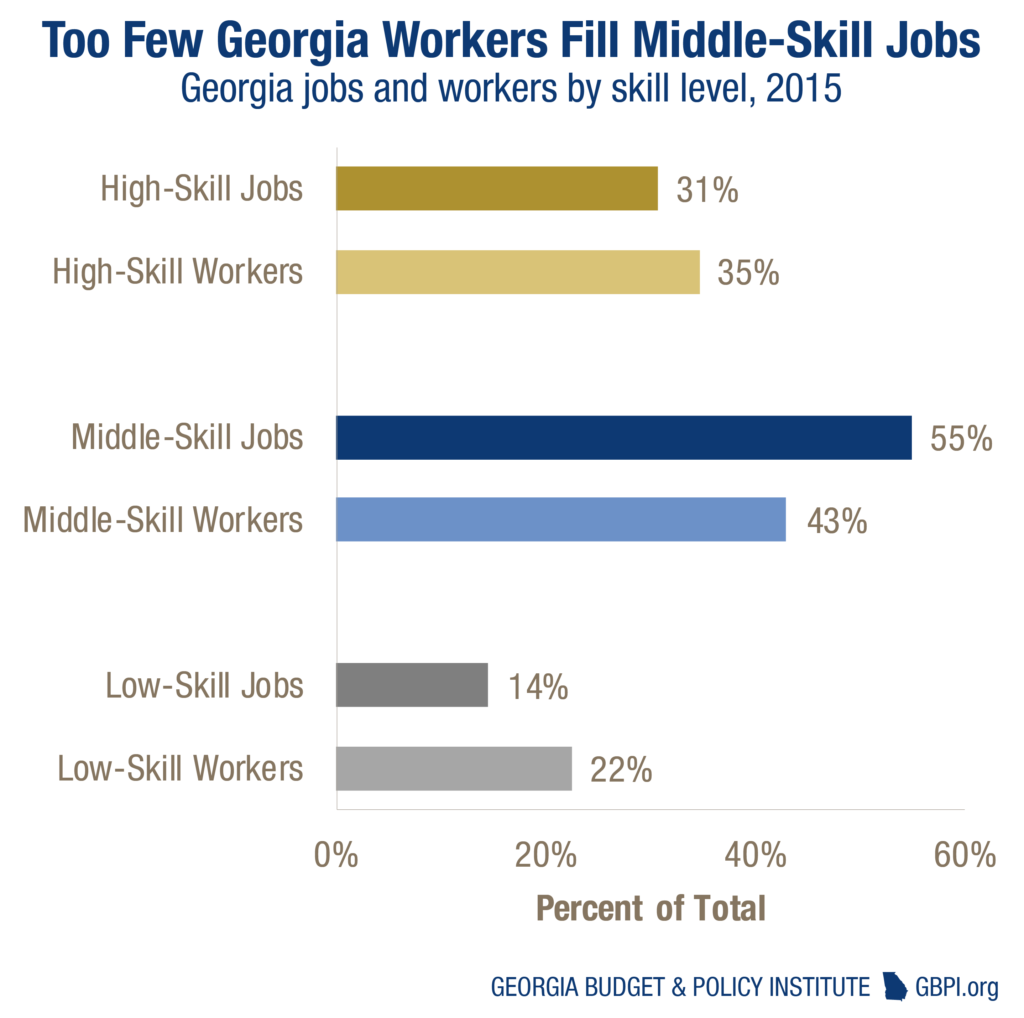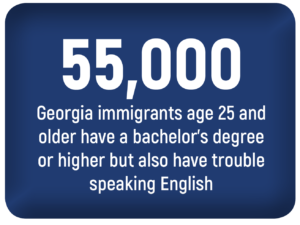 Companies and entrepreneurs thrive when they can find workers with a rich set of skills. Support for higher education, training services and basic literacy that offer lifelong learning opportunities for people are among the policies that can help Georgia fill workforce gaps and empower Georgians to transform their lives, improve their earnings and career opportunities and contribute more to their communities and the economy.
Companies and entrepreneurs thrive when they can find workers with a rich set of skills. Support for higher education, training services and basic literacy that offer lifelong learning opportunities for people are among the policies that can help Georgia fill workforce gaps and empower Georgians to transform their lives, improve their earnings and career opportunities and contribute more to their communities and the economy.
Make university education more affordable and technical college tuition-free.
Georgia can claim a proud legacy of support for colleges and universities. The state chartered the country’s first public university in 1785 at the University of Georgia, and about two centuries later it launched the most ambitious merit-based aid program in the United States.[62] Yet too many promising Georgians struggle to access education beyond high school due to high costs and gaps in the state’s financial aid strategy.

Steep funding cuts to higher education since 2000 led to rising tuition and fees statewide, making college less affordable and undermining Georgia’s ability to produce an educated workforce.[63] Georgia needs 250,000 additional college graduates to meet its own workforce goals by 2025. But the university and technical college systems estimate that between 20,000 to 30,000 students are dropped each year due solely to failure to pay tuition.[64]
Georgia’s main strategy to make college affordable is the HOPE program. Though HOPE scholarships and grants are generous, relying on them alone leaves gaps for many students. In the university system, 70 percent of low-income students and 80 percent of black students do not receive HOPE.[65] And adult learners and associate’s degree seekers are locked out of the program due to certain arbitrary limits.[66]
Georgia can reclaim its place as a leader in higher education by reinvesting in its colleges and expanding financial aid to better reach Georgians of all backgrounds. An improved and affordable suite of aid strategies such as work-study programs and last-dollar scholarships that cover tuition and fees left after other financial aid runs out can help make a post high-school education a reality for more Georgians.
More details: “Strengthen Georgia’s Workforce by Making College Affordable for All,” GBPI, January 2018.
Increase funding for adult basic education, language literacy and skills-training programs.
Along with a better path to college, improved access to lifelong learning opportunities for adults is crucial for Georgia’s economy. Renewed state support for programs that help people learn new job skills or gain entry level abilities like language literacy can help to fill companies’ short-term needs and improve people’s long-term prospects.[67] This is especially important when viewed alongside the state’s mid-skill jobs gap. Middle-skill jobs include occupations such as nursing assistants and electricians that require education beyond high school but typically less than a four-year degree. These professions account for 55 percent of Georgia’s labor market but only 43 percent of the state’s workers are trained to do them, an imbalance that could grow larger soon.[68]

The state’s Complete College Georgia initiative reports that boosting the number of adult learners is a key component to fill Georgia’s skill gap.[69] Yet state leaders devoted only $14 million to adult basic education in 2016.[70] Thirty-six states spend more to educate their adult population, with services such as language literacy, basic numeracy and computer skill training.[71] Georgia can strengthen its pipeline of workers with a better-funded, multipronged approach to adult education.
One of the most promising strategies is to create a career pathways program for low-income parents, at an estimated cost of $31 million a year in federal funds. Common in other states, career pathways are a series of connected education programs and support services that help people secure employment in a specific industry or occupation. One such program in Arkansas is credited with boosting incomes for participating low-income families by $3,000 and roughly doubling their likelihood to gain some sort of workforce credential.
More details: “Career Pathways can Strengthen Georgia Families,” GBPI, June 2017.
 Another option is to expand state funding for English as a Second Language classes, which received less than $2 million in 2016. More than 300,000 members of Georgia’s adult workforce report a lack of English proficiency, but the state’s English language programs enrolled only 12,000 people in 2016. Among this underserved population are 55,000 Georgians who completed a college education abroad yet struggle to speak fluent English.
Another option is to expand state funding for English as a Second Language classes, which received less than $2 million in 2016. More than 300,000 members of Georgia’s adult workforce report a lack of English proficiency, but the state’s English language programs enrolled only 12,000 people in 2016. Among this underserved population are 55,000 Georgians who completed a college education abroad yet struggle to speak fluent English.
More details: “Underfunded English Training Limits Contribution from Georgia’s College-Educated Immigrants,” GBPI, April 2017.








